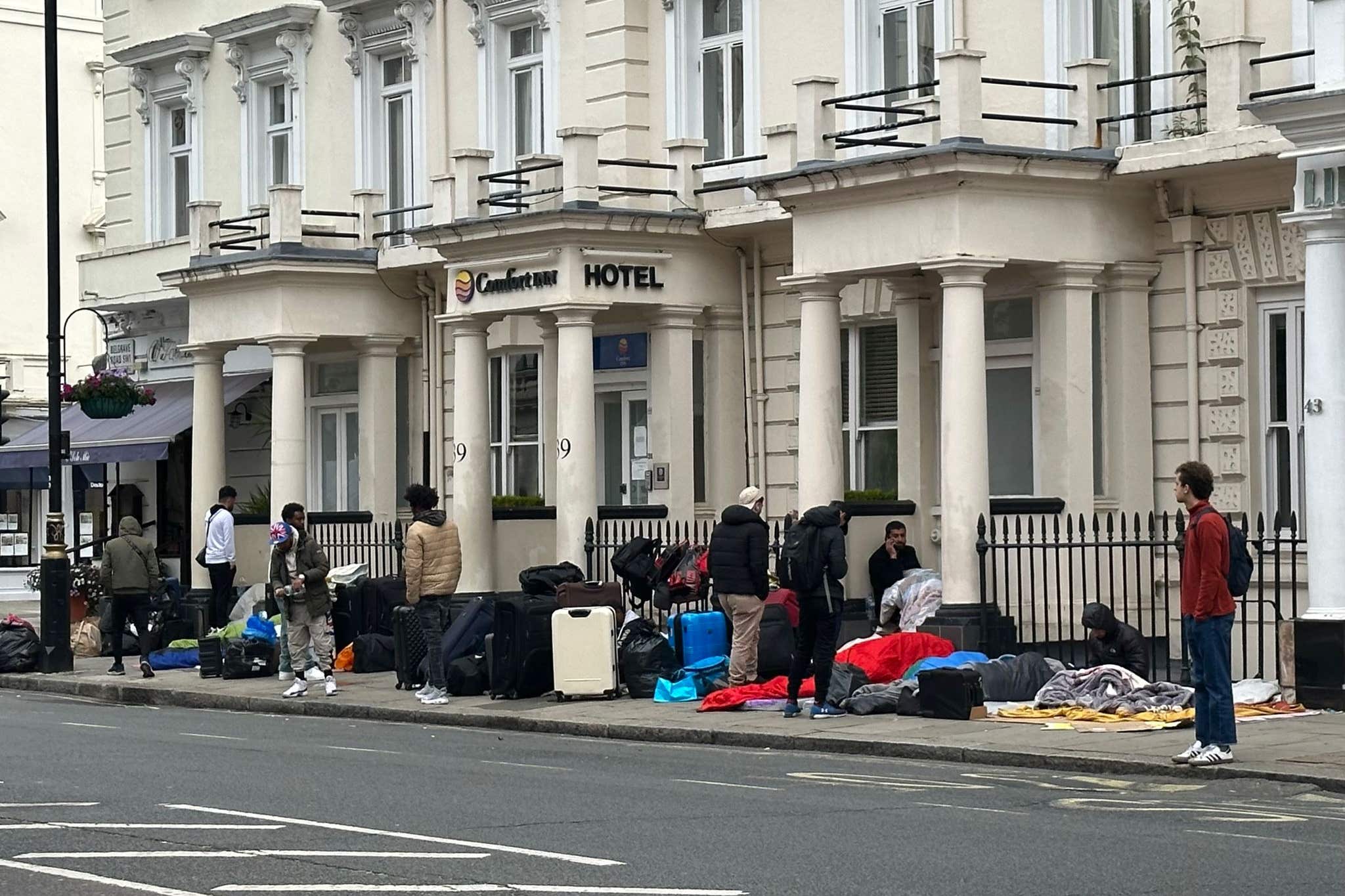Dozens of refugees ‘left on the streets’ in Westminster for two nights
The asylum seekers apparently refused to enter a hotel in which the Home Office asked them to sleep ‘four people per room’.

Your support helps us to tell the story
From reproductive rights to climate change to Big Tech, The Independent is on the ground when the story is developing. Whether it's investigating the financials of Elon Musk's pro-Trump PAC or producing our latest documentary, 'The A Word', which shines a light on the American women fighting for reproductive rights, we know how important it is to parse out the facts from the messaging.
At such a critical moment in US history, we need reporters on the ground. Your donation allows us to keep sending journalists to speak to both sides of the story.
The Independent is trusted by Americans across the entire political spectrum. And unlike many other quality news outlets, we choose not to lock Americans out of our reporting and analysis with paywalls. We believe quality journalism should be available to everyone, paid for by those who can afford it.
Your support makes all the difference.Suella Braverman has been asked to “urgently clarify” why a large group of asylum seekers were “left on the street” in Westminster for two nights.
In a letter to the Home Secretary, the leader of Westminster City Council expressed his “deep concern” that around 40 refugees were placed in the borough on Wednesday night “without appropriate accommodation or support available” and no prior communication with the local authority.
The group apparently refused to enter a Pimlico hotel where the Home Office had asked them to sleep “four people per room”.
When dealing with a group of people where many of whom are likely to have been through significant and traumatic events that have led them to seek asylum, asking them to share an inappropriately-sized room with multiple strangers defies common sense and basic decency
On Friday morning, around 20 people were still camped outside the Comfort Inn in protest at the cramped conditions inside, according to the council.
Sat in doorways and on the floor, most of the individuals were dressed in tracksuit bottoms and thick jackets despite the warm weather.
Items scattered on the pavement included suitcases, sleeping bags and even trays of food.
The group later briefly stood in the middle of Belgrave Road blocking traffic, before being escorted to the pavement by Met Police officers.
A spokesperson for the force said officers were “engaging with those involved and remain at the location in order to prevent any breach of the peace”.
On Friday afternoon, after officers had left the scene, asylum seekers went into the hotel to speak with a representative from the Home Office.
It was unclear whether an agreement had been reached, and the department declined to comment.
In his letter to Mrs Braverman, council leader Adam Hug complained that asking people who “are likely to have been through significant and traumatic events” to share “an inappropriately-sized room with multiple strangers defies common sense and basic decency”.
He said the Government’s demand created “safeguarding and health risks”, and noted that “leaving them on the street for multiple nights is not an alternative”.
In his letter to Ms Braverman on Thursday, he wrote: “Neither the Home Office nor the hotel itself responded to this incident, ultimately leaving it to council officers to manage and support this large group overnight. I would ask that you urgently clarify how this was allowed to happen, why this was acceptable, and why no communication was made with the local authority to alert us.
It is not right, nor is it in the interest of these individuals - or our residents - to have them forced to endure a night on the streets because their transition into new accommodation has not been properly managed
“I note that the issue is still unresolved and, as of Thursday evening, all 40 asylum seekers remain on the street. This is not acceptable.
“It is not right, nor is it in the interest of these individuals – or our residents – to have them forced to endure a night on the streets because their transition into new accommodation has not been properly managed.”
Rough sleeping teams have been supporting the refugees, according to the council, which claimed the Home Office had not put forward any resolution to the matter.
A Home Office spokesman said: “Despite the number of people arriving in the UK reaching record levels, we continue to provide accommodation – at a cost of £6 million a day – for asylum seekers who would otherwise be destitute, to meet our legal obligation.
“The accommodation offered to asylum seekers by providers, on a no-choice basis, is of a decent standard and meets all legal and contractual requirements.”